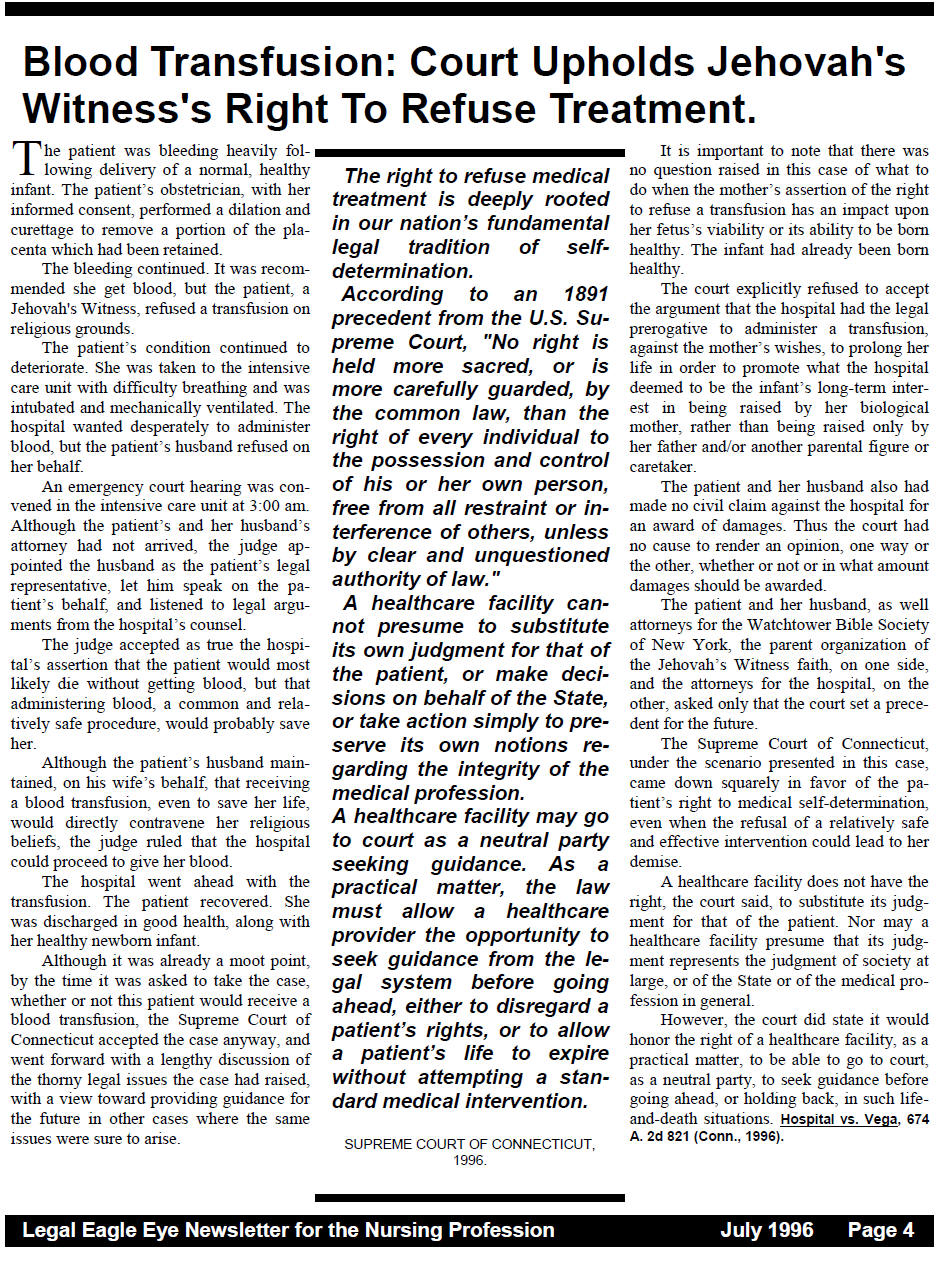
Legal Eagle Eye Newsletter for the Nursing Profession Home Page
I About Our Newsletter I Sample Newsletter I FAQ

The right to refuse medical treatment is deeply rooted in our nation’s fundamental legal tradition of self-determination.
According to an 1891 precedent from the U.S. Supreme Court, "No right is held more sacred, or is more carefully guarded, by the common law, than the right of every individual to the possession and control of his or her own person, free from all restraint or interference of others, unless by clear and unquestioned authority of law."
A healthcare facility cannot presume to substitute its own judgment for that of the patient, or make decisions on behalf of the State, or take action simply to preserve its own notions regarding the integrity of the medical profession.
A healthcare facility may go to court as a neutral party seeking guidance. As a practical matter, the law must allow a healthcare provider the opportunity to seek guidance from the legal system before going ahead, either to disregard a patient’s rights, or to allow a patient’s life to expire without attempting a standard medical intervention.
SUPREME COURT OF CONNECTICUT, 1996.The patient was bleeding heavily following delivery of a normal, healthy infant. The patient’s obstetrician, with her informed consent, performed a dilation and curettage to remove a portion of the placenta which had been retained. The bleeding continued. It was recommended she get blood, but the patient, a Jehovah's Witness, refused a transfusion on religious grounds.
The patient’s condition continued to deteriorate. She was taken to the intensive care unit with difficulty breathing and was intubated and mechanically ventilated. The hospital wanted desperately to administer blood, but the patient’s husband refused on her behalf.
An emergency court hearing was convened in the intensive care unit at 3:00 am. Although the patient’s and her husband’s attorney had not arrived, the judge appointed the husband as the patient’s legal representative, let him speak on the patient’s behalf, and listened to legal arguments from the hospital’s counsel.
The judge accepted as true the hospital’s assertion that the patient would most likely die without getting blood, but that administering blood, a common and relatively safe procedure, would probably save her. Although the patient’s husband maintained, on his wife’s behalf, that receiving a blood transfusion, even to save her life, would directly contravene her religious beliefs, the judge ruled that the hospital could proceed to give her blood.
The hospital went ahead with the transfusion. The patient recovered. She was discharged in good health, along with her healthy newborn infant.
Although it was already a moot point, by the time it was asked to take the case, whether or not this patient would receive a blood transfusion, the Supreme Court of Connecticut accepted the case anyway, and went forward with a lengthy discussion of the thorny legal issues the case had raised, with a view toward providing guidance for the future in other cases where the same issues were sure to arise.
It is important to note that there was no question raised in this case of what to do when the mother’s assertion of the right to refuse a transfusion has an impact upon her fetus’s viability or its ability to be born healthy. The infant had already been born healthy.
The court explicitly refused to accept the argument that the hospital had the legal prerogative to administer a transfusion, against the mother’s wishes, to prolong her life in order to promote what the hospital deemed to be the infant’s long-term interest in being raised by her biological mother, rather than being raised only by her father and/or another parental figure or caretaker.
The patient and her husband also had made no civil claim against the hospital for an award of damages. Thus the court had no cause to render an opinion, one way or the other, whether or not or in what amount damages should be awarded.
The patient and her husband, as well attorneys for the Watchtower Bible Society of New York, the parent organization of the Jehovah’s Witness faith, on one side, and the attorneys for the hospital, on the other, asked only that the court set a precedent for the future.
The Supreme Court of Connecticut, under the scenario presented in this case, came down squarely in favor of the patient’s right to medical self-determination, even when the refusal of a relatively safe and effective intervention could lead to her demise.
A healthcare facility does not have the right, the court said, to substitute its judgment for that of the patient. Nor may a healthcare facility presume that its judgment represents the judgment of society at large, or of the State or of the medical profession in general. However, the court did state it would honor the right of a healthcare facility, as a practical matter, to be able to go to court, as a neutral party, to seek guidance before going ahead, or holding back, in such life-and-death situations. Hospital vs. Vega, 674 A. 2d 821 (Conn., 1996).